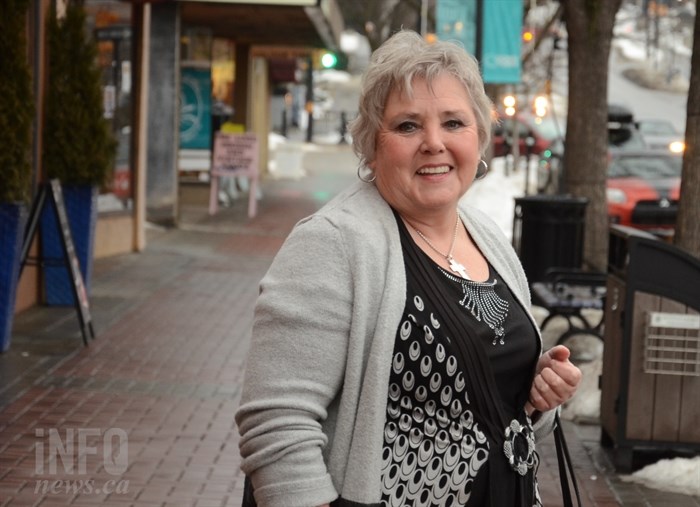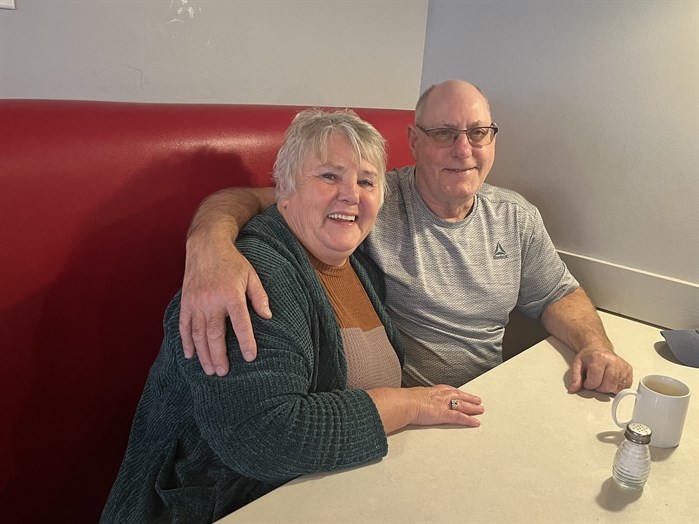
Vernon resident Christine Aiken has been living with early onset vascular dementia since being diagnosed in 2015, and is an active advocate for improving the lives of those living with dementia.
(BEN BULMER / iNFOnews.ca)
November 24, 2024 - 7:00 AM
Every year more people are choosing medical assistance in dying in the Interior Health Authority since it became legal eight years ago.
People with a variety of grievous health conditions can get assistance from a medical practitioner to end their life under rules and criteria outlined in the criminal code of Canada, but one demographic continues to be excluded from the process, those suffering solely from dementia.
“Having the option of MAID can bring peace to those with dementia, we need it, we need to be able to choose for ourselves,” Vernon resident Christine Aiken told iNFOnews.ca.
Aiken has been living with early onset vascular dementia since being diagnosed in 2015, and is an active advocate for improving the lives of those living with dementia.
“Being denied this option is so wrong, we don’t let our animals suffer so why is it OK to make people suffer, it's inhumane?” she said. “It’s not only them that goes through the pain and suffering, and I don’t use the word suffering very often, but in this case dementia causes pain and suffering for the people living with it and their families.
"Dying slowly, not knowing who I am anymore is the last thing I want for myself and my loved ones."
Dementia is a term for several diseases that affect memory, thinking and the ability for a person to perform daily activities. Mainly impacting older people, there is no cure for the progressive disease, according to the World Health Organization.
As of January, the Alzheimer Society of Canada predicted more than 733,000 people in the country are living with the disease with 350 new cases developing every day.
MAID was first legalized in Canada in 2016 after a Supreme Court of Canada ruling said people with irremediable medical conditions should have the right to ask a doctor to help them die.
The legislation was revised in 2021 to allow the procedure to people who are suffering but not close to dying.
READ MORE: Penticton 'potio' smoking lounge blazing a trail for cannabis tourism

Christine Aiken (left) and her husband Wayne Aiken stopped for a breakfast date at Harold's Family Restaurant in Kamloops in November.
(SHANNON AINSLIE / iNFOnews.ca)
Technically a person with dementia can access assisted dying if they meet all the requirements, but the law requires a final consent just before MAID is administered, along with decision-making capacity, according to the Dying with Dignity website.
A person with dementia is likely to lose the ability to make an informed decision by that stage.
Advocates have been pushing for the legal right to advanced MAID requests, which would allow dementia sufferers to describe in writing, future circumstances in which they would like to have the procedure.
“If I can make that decision now, that this is what I want to happen when I reach this stage, (my husband) should be able to ensure it happens,” Aiken said. “It should be in a legal document that I’ve already gone through in detail with the proper personnel.”
The topic of administering MAID to those with cognitive declines including dementia is highly controversial as it’s hard for someone to predict how they’ll feel as their disease progresses.
READ MORE: iN PHOTOS: Okanagan pet portraitist creates emotional works of art
In February 2023, the Special Joint Committee on MAID requested the federal government amend the criminal code to allow for advance requests. In June of that year the Quebec provincial government adopted an act that would allow for advance requests without waiting for the federal criminal code amendments.
On Oct. 30, Quebec’s Health Department began accepting requests, becoming the first province to allow medically assisted death to be administered months or years in advance. That province asked the Crown prosecutors not to charge doctors who participate in the advanced MAID program as long as they’re in compliance with provincial law.
“I’m so excited for those people of Quebec,” Aiken said. “I can see a lot of people want access to this, I hope it rolls out across the country.
“I know people who have MAID for their loved ones, it’s the most beautiful celebration as the person leaves the room surrounded by family and friends. I’m hoping this becomes available in BC, it would bring me so much reassurance.”
READ MORE: Vernon man found not criminally responsible for killing his mother has day release extended
In 2017, 118 residents in the BC Interior chose MAID. Every year that number has steadily increased with the most current statistics recorded in 2023 at 635 patients undergoing the procedure, according the BC government.
The genders of people choosing MAID have remained at roughly half men and half women with the average ages between 76 and 79.
Last year, 40.2% of the procedures took place in private residences, 26.9% in hospitals and 12.9% at hospices. MAID is most commonly prescribed by family physicians, and only medical practitioners are allowed to assess a patient and do the procedure.
By far the biggest health reason for choosing MAID is cancer which accounts for over 50% of MAID deaths.
— With files from The Canadian Press
To contact a reporter for this story, email Shannon Ainslie or call 250-819-6089 or email the editor. You can also submit photos, videos or news tips to the newsroom and be entered to win a monthly prize draw.
We welcome your comments and opinions on our stories but play nice. We won't censor or delete comments unless they contain off-topic statements or links, unnecessary vulgarity, false facts, spam or obviously fake profiles. If you have any concerns about what you see in comments, email the editor in the link above. SUBSCRIBE to our awesome newsletter here.
News from © iNFOnews, 2024